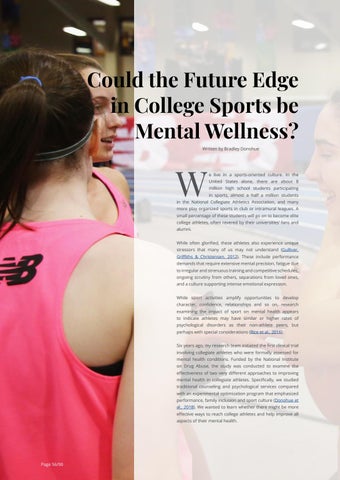Could the Future Edge in College Sports be Mental Wellness? Written by Bradley Donohue
W
e live in a sports-oriented culture. In the United States alone, there are about 8 million high school students participating in sports, almost a half a million students
in the National Collegiate Athletics Association, and many more play organized sports in club or intramural leagues. A small percentage of these students will go on to become elite college athletes, often revered by their universities’ fans and alumni. While often glorified, these athletes also experience unique stressors that many of us may not understand (Gulliver, Griffiths & Christensen, 2012). These include performance demands that require extensive mental precision, fatigue due to irregular and strenuous training and competitive schedules, ongoing scrutiny from others, separations from loved ones, and a culture supporting intense emotional expression. While sport activities amplify opportunities to develop character, confidence, relationships and so on, research examining the impact of sport on mental health appears to indicate athletes may have similar or higher rates of psychological disorders as their non-athlete peers, but perhaps with special considerations (Rice et al., 2016). Six years ago, my research team initiated the first clinical trial involving collegiate athletes who were formally assessed for mental health conditions. Funded by the National Institute on Drug Abuse, the study was conducted to examine the effectiveness of two very different approaches to improving mental health in collegiate athletes. Specifically, we studied traditional counseling and psychological services compared with an experimental optimization program that emphasized performance, family inclusion and sport culture (Donohue et al., 2018). We wanted to learn whether there might be more effective ways to reach college athletes and help improve all aspects of their mental health.
Page 56/90












